
Back Droit français French Hukum di Prancis ID Diritto francese Italian フランス法 Japanese ಫ್ರೆಂಚ್ ನ್ಯಾಯ Kannada 프랑스의 법 Korean Drech francés Occitan System prawny Francji Polish Правовая система Франции Russian Правова система Франції Ukrainian
French law has a dual jurisdictional system comprising private law (droit privé), also known as judicial law, and public law (droit public).[1][2]

Judicial law includes, in particular:
- Civil law [fr] (droit civil)
- Criminal law (droit pénal)
Public law includes, in particular:
- Administrative law (droit administratif)
- Constitutional law [fr] (droit constitutionnel)
Together, in practical terms, these four areas of law (civil, criminal, administrative and constitutional) constitute the major part of French law.
The announcement in November 2005 by the European Commission that, on the basis of powers recognised in a recent[when?] European Court of Justice ("ECJ") ruling,[clarification needed] it intends to create a dozen or so European Union ("EU") criminal offences[clarification needed] suggests that one should[weasel words] also now consider EU law ("droit communautaire", sometimes referred to, less accurately, as "droit européen") as a new and distinct area of law in France (akin to the "federal laws" that apply across States of the US, on top of their own State law), and not simply a group of rules which influence the content of France's civil, criminal, administrative and constitutional law.[citation needed]
- ^ Bermann & Picard 2008, p. 58.
- ^ MDLJ-OrgJustice 2021.